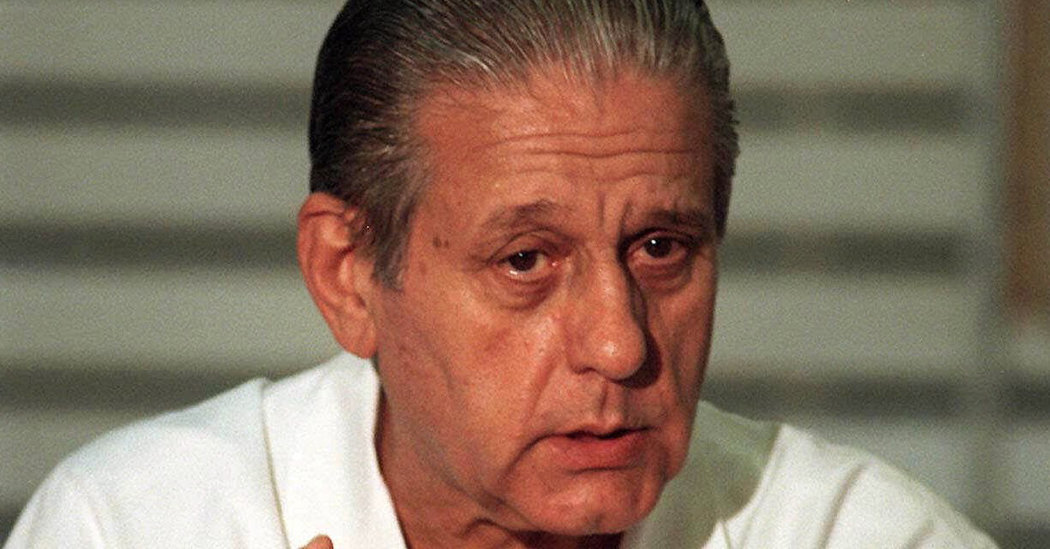
Today would have been the 96th birthday of Dr. Rene G. Favaloro, who is commemorated in today’s Google Doodle. Here is the full Times obituary from Aug. 1, 2000.
Dr. Rene G. Favaloro, a pioneer in heart-bypass surgery and a revered figure in Argentina, was found dead on Saturday at his home in Buenos Aires. He was 77.
The police said his death appeared to have been a suicide.
Dr. Favaloro, who left a successful career in the United States to create a top-level teaching clinic in his home country, was distraught over his hospital’s financial problems.
The son of a carpenter and a dressmaker from a small town in Argentina, Dr. Favaloro achieved renown on Nov. 30, 1967, when he performed an operation at the Cleveland Clinic on a patient with a potentially deadly coronary artery blockage.
After stopping the heart, Dr. Favaloro took a section of vein from the patient’s leg and sewed one end to his aorta. Then, much the way a driver might use a side road to go around a traffic jam, Dr. Favaloro attached the other end to the blocked artery, beyond the blockage.
That was not, as it turned out, the first time for the procedure. After Dr. Favaloro, a little-known surgeon, had announced his results, two prominent surgeons said they had already performed the procedure. One, Dr. David C. Sabiston Jr. of Duke University, performed the first, in 1962. Two years later, Dr. H. Edward Garrett, an associate of Dr. Michael DeBakey, performed another.
Those operations had been done in response to deteriorating conditions on the operating table. Dr. Favaloro’s procedure was planned. It was also the first to be reported in a medical journal. He went on to refine the method. In one year, the clinic had performed 171 bypasses.
“He’s really the person who should get credit for introducing coronary bypass into the clinical arena,” said Dr. Robert H. Jones, a professor of surgery at Duke who was a friend of Dr. Favaloro.
Before Dr. Favaloro’s operation, doctors had few reliable tools to treat heart disease. Some surgeons tried to attach muscle to the heart, in the hope that the veins would graft and improve blood flow. Other physicians opened the artery and tried to scrape out the blocking material.
Dr. Favaloro received numerous honors. But he took pains not to overstate his accomplishment, telling anyone who asked that he had simply built on the work of others before him and that in any case he had not acted alone. “I do not talk in the form ‘I,’ “ Dr. Favaloro said in an interview in 1992. “At the Cleveland Clinic, we were a team.”
Dr. Favaloro did not remain to cash in on his fame. Four years after the operation, he returned to Argentina.
Rene Geronimo Favaloro was born on July 14, 1923, the son of Juan B. Favaloro and Ida Y. Raffaelli. The lone member of the family to have a university education, according to The Times of London, was an uncle who was a doctor, and Rene was inspired to follow his path.
After graduating from medical school, he agreed to fill in for several months for an ailing country surgeon in Jacinto Arauz, an impoverished village 300 miles west of the capital. Twelve years passed before he made his way to the Cleveland Clinic where, despite lacking some credentials, he was taken on as, essentially, an apprentice, according to Dr. Delos M. Cosgrove, co-chairman of the heart center at the clinic.
The lessons of his rural practice were never lost on him. He once told The San Diego Union Tribune that he thought that all doctors in Latin America should be required to work among the poor.
“They would be able to see the combination of dirt and fumes,” he said. “The people have only one room where they cook, they live, they make love, where they have their children, where they eat.”
When Dr. Favaloro returned to Argentina, he set to work raising money for a $55 million heart clinic. After it was completed in the early ’90s, he treated thousands of patients, often for no charge, and trained hundreds of surgeons.
He received numerous entreaties to run for president and was a member of a commission formed in 1983 to investigate the disappearance of more than 6,000 Argentines under the military dictatorship.
In recent years, fortunes began to sour. Dr. Favaloro’s wife, the former Maria A. Delgado, died several years ago. The couple had no children.
The finances of the Favaloro Foundation, as the hospital was known, became grim. About a year ago, Dr. Cosgrove recalled, his friend told him that he could not make it to Toronto for an important medical conference, because of financial problems.
Late last month, according to Reuters, Dr. Favaloro told Health Minister Hector Lombardo that his clinic was having serious financial problems. In a recent letter to the editor of La Nacion, the newspaper, he said other hospitals and state-owned medical centers owed the foundation $18 million.
“I am going through the saddest period of my life,” he wrote. “In the most recent times, I have been turned into a beggar.”
Dr. Favaloro’s secretary found his body in the bathroom of his apartment. There was a wound to his chest. A gun was nearby.

